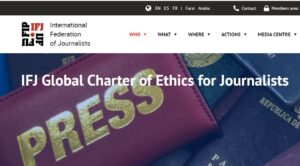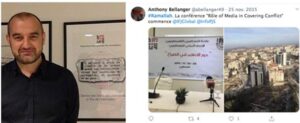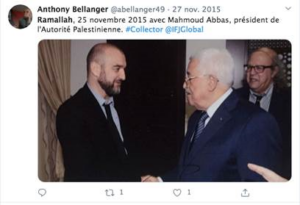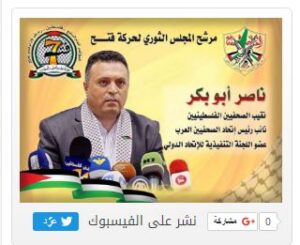- 288
- 288SHARES
Are Israeli journalists the victims of an international boycott on the part of their professional colleagues?
 For the last decade, organizations representing Israeli journalists have been banished from the International Federation of Journalists, ostensibly due to the “non-payment of fees.” But according to the Israeli organizations, they are blacklisted out of political considerations.
For the last decade, organizations representing Israeli journalists have been banished from the International Federation of Journalists, ostensibly due to the “non-payment of fees.” But according to the Israeli organizations, they are blacklisted out of political considerations.
Founded in 1926 and representing more than 600,000 journalists from 187 trade unions and associations and 146 countries, the IFJ is the world’s oldest and largest organization of media professionals.
In 2009, the IFJ’s executive committee unanimously voted to expel the National Federation of Israeli Journalists on the grounds of “non-payment of fees.” The executive committee maintained that “there was no political element in the decision.”
But Haim Shibi, director of the Journalists Association in Jerusalem, and formerly a senior official in the National Federation of Israeli Journalists, has a very different account as to what transpired.
In an email correspondence with InfoEquitable, a French media watchdog which works closely with CAMERA, Shibi confirmed that by 2009 the Israeli union had refused to pay its dues for a number of years, saying the refusal was “due to a blatant and ongoing anti-Israel bias, which escalated over the years.” Shibi noted the “boycott of the Journalists Association in Jerusalem during Middle East visits by the heads of the federation even as they attended meetings in Ramallah. The lack of invitation to the Israeli journalists association to these meetings. The total absence of any interest in coming to a discussion in Jerusalem. Not even the pretense of equal treatment.”
Shibi describes the “repeated publication of anti-Israel condemnations, statements about journalists without event bothering to inform the association in advance or at least to get a response in advance, and more than one statement condemning Israel, copied word for word from the Palestinian syndicate.” In a 2009 report, Shibi explained that the “Israel representation was not even invited to the ousting meeting in Oslo,” when it should have at least been given the opportunity to voice its position.
“We told Aiden White, secretary general of the federation, that we would no longer accept the situation in which the federation’s delegation of solidarity with Gaza residents and journalists comes to the region — while there was no solidarity delegation for the residents of Sderot and Israeli journalist,” Shibi continued. “We will not accept a situation in which Israeli representatives at the federation’s international gatherings are exposed to a campaign of boycott and hatred including on the part of journalists whose only connection to free press is completely incidental.”
The Influential Nasser Abu Baker
Nasser Abu Baker, chairman of the Palestinian Journalists Syndicate and a journalist at the Agence France Presse in Ramallah, also holds a senior position as an advisor to the IFJ’s executive committee. In 2016, CAMERA revealed that in his senior positions at PJS, Abu Baker led a campaign promoting the boycott of Israeli journalists, and he had also called for the boycott of Palestinian officials who dared to converse with Israeli journalists.
In addition, Abu Baker also infamously threw his hat into the ring for the 2016 Fatah Revolutionary Council elections.
CAMERA’s exposé revealing Abu Baker’s political candidacy in Fatah, an organization which prides itself on the murder of 11,000 Israelis and sacrifice of 170,00 martyrs since its founding, according to its own count, prompted AFP to suspend him for a week on the grounds that his partisan activity was a clear violation of the agency’s code of ethics.
The International Federation of Journalists subsequently published (together with the French Journalists Syndicate and the French Democratic Confederation of Labour) an announcement in support of Abu Baker, objecting to his short-term suspension, claiming that the sanctions against the Palestinian journalist was unjustified and supposedly resulted from demonization on the part of “an extremist Israeli website” (an apparent reference to CAMERA).
Abu Baker delivered a speech at the European Federation of Journalists’s 2016 conference in Sarajevo (the regional head branch). On this platform, he refused any contact with Israeli journalists, and rejected offers from his Israeli colleagues of “coordination.”
The press releases, tweets and various activities of the IFJ, with Abu Baker as advisor, point to a clear anti-Israel line consistent with Palestinian Authority positions.
 In November 2015, for instance, Anthony Bellanger, IFJ’s secretary general, traveled to Ramallah to take part in a conference sponsored by the Palestinian Authority on “the role of media in covering conflict.”
In November 2015, for instance, Anthony Bellanger, IFJ’s secretary general, traveled to Ramallah to take part in a conference sponsored by the Palestinian Authority on “the role of media in covering conflict.”
According to Bellanger, at the conference, Saeb Erekat, secretary general of the executive committee of the Palestine Liberation Organization, lionized “the 36 martyrs of the Third Intifada,” referring to Palestinian assailants killed as they carried out stabbing, ramming and shooting attacks against Israelis in the so-called “stabbing intifada.” Erekat also accused Israel of “muzzling the media,” and fabricated that “since 1947 our weapon has always been international law.”
 Two days later, Bellanger, IFJ’s secretary general, tweeted a photograph of himself shaking hands with Palestinian President Mahmoud Abbas.
Two days later, Bellanger, IFJ’s secretary general, tweeted a photograph of himself shaking hands with Palestinian President Mahmoud Abbas.
The Palestinian Authority’s low ranking of 137 (out of 180 states) in Reporters Without Borders’ 2020 World Press Freedom Index did not deter the enthused secretary general.
In 2018, the federation once again participated in a conference that took place in Ramallah. During the event, IFJ president Philippe Leruth gave then Palestinian Prime Minister Rami Hamdallah an honorable international press card. And in a literal demonstration of the IFJ’s anti-Israel bon ton, the organizations that took part in the conference – including many French journalists belonging to the IFJ – participated in an anti-Israel protest in the streets of Ramallah, under the protection of Palestinian forces.
The federation does not act against Israel only in demonstrations and declarations, but also in decisions. During the IFJ’s 2019 international conference which took place in Tunis, out of the 70 resolutions passed, two targeted Israel.
The Palestinian Journalists Syndicate proposed the first motion entitled “Stop Attacks Against Journalists in Palestine.” The resolution accused the Israeli army and settlers with the use of force against Palestinian journalists and falsely claims the “settlers’ presence in the Palestinian territories occupied in 1967 is considered as a war crime.”
It also calls on the IFJ’s leadership to “support the PJS campaign to defend its members” and “To lodge jointly with the PJS a formal complaint at the ILO [International Labour Organization] against the Israel Defense Force while calling on other IFJ unions to join in such action in whatever way possible.”
The second resolution, entitled “Freedom of press must be allowed in the Palestinian territories,” was introduced by the French Journalists Syndicate (SNJ), the most important union of French journalists, along with a Spanish union (FSC CC-OO). The decision condemned ” the repression of the occupying forces against the freedom to inform and be informed in the Palestinian territories,” accused the Israeli army of the targeted killing of Palestinian journalists, and alleged Israel’s placement of “obstacles of all kinds, including ‘administrative detention’ in the exercise of their profession.” The motion
Condemns this harassment worthy of the most shameful regimes, gives its full support to Palestinian journalists, the Palestinian Journalist Syndicate and its President injured during the march and calls on its affiliates to protest to the Israeli embassies in their countries to stop these practices.
While falsifying the reality of Israel’s treatment of journalists, the two resolutions ignored that the terrible state of press freedom in the Palestinian territories is a result of the actions of the Palestinian Authority in the West Bank and Hamas in the Gaza Strip.
A separate motion, dedicated to “Media Reforms in Palestine,” hued to a more conciliatory style with respect to abuses on the part of the Palestinian government.
The text praised Palestinian leader Mahmoud Abbas as “the first Arab leader to sign in August 2016 the IFJ’s Declaration on Media Freedom in the Arab world, a clear commitment to the principles of media freedom, independent journalism and the right to information.” It nevertheless proceeded to add criticism of the Palestinian authorities’ delay in implementing the reform.
A comparative reading of the two resolutions points to the IFJ’s blatant political tipping of the scale in favor of the Palestinians, at Israel’s expense.
The French Journalist Syndicate’s consistent role as a central player in the advancement of all the anti-Israel campaigns led by the Palestinian Journalists Syndicate is particularly noteworthy.
Silence Prevails About Threats Against Israeli Journalists
 IFJ’s complete lack of neutrality when it comes to Israel was again apparent in its total silence in the wake of an April 2020 Fatah video threatening three Israeli journalists by name, falsely depicting them as agents of the Israeli military. As previously reported by CAMERA, IFJ did not publish one single announcement protesting the threat to Israeli media professionals, and did not voice a word in solidarity with their targeted Israeli colleagues.
IFJ’s complete lack of neutrality when it comes to Israel was again apparent in its total silence in the wake of an April 2020 Fatah video threatening three Israeli journalists by name, falsely depicting them as agents of the Israeli military. As previously reported by CAMERA, IFJ did not publish one single announcement protesting the threat to Israeli media professionals, and did not voice a word in solidarity with their targeted Israeli colleagues.
IFJ Failed to Respond to InfoEquitable
InfoEquitable sent a detailed letter to the IFJ, asking for response. As of this writing, InfoEquitable has yet to receive a response, but will share any future communication from IFJ.
This article originally appeared in French at InfoEquitable.

